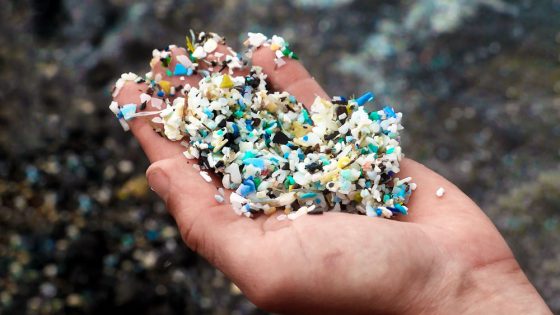This article was originally published by Ava Grace at Natual News.
-
- A study published in Applied and Environmental Microbiology found that Escherichia coli bacteria exposed to microplastics become five times more resistant to four common antibiotics, highlighting a dangerous link between plastic pollution and the rise of antibiotic-resistant superbugs.
-
- Microplastics – found in oceans, soil, air, and drinking water – act as carriers for bacteria, enabling them to form biofilms that protect against antibiotics and spread resistance across environments.
-
- Wastewater treatment facilities, which contain both microplastics and antibiotics, are identified as key sites where bacteria develop resistance – posing a significant public health risk as treated water is released back into the environment.
-
- The combination of microplastics and antibiotic resistance is expected to worsen health disparities, particularly in disadvantaged communities with poor sanitation and limited healthcare access.
-
- Researchers call for stricter plastic waste regulations, improved wastewater treatment, and more funding to study microplastic-bacteria interactions, emphasizing the critical need for global cooperation to address this dual crisis of plastic pollution and antibiotic resistance.
Researchers from Boston University (BU) have uncovered a disturbing link between microplastics and antibiotic resistance, raising alarms about the unintended consequences of our plastic-laden world.
Their study published Tuesday, March 11, in Applied and Environmental Microbiology revealed that Escherichia coli bacteria are exposed to microplastics, they become five times more resistant to four widely used antibiotics. While E. coli is a common bacterium that typically resides harmlessly in the human gut, certain strains can be harmful and cause severe infections.
The study authors focused on a laboratory strain of E. coli, which they then cultured with microplastics. The bacteria subsequently formed biofilms – sticky, protective layers that act like armor – on the surface of microplastics. These biofilms made the bacteria significantly harder to kill with drugs like ciprofloxacin, doxycycline, fluoroquinolone and ampicillin.
What’s particularly troubling is that this resistance isn’t limited to a single antibiotic. The study also found that microplastics broadly enhance the bacteria’s ability to withstand multiple drugs, making infections harder to treat and potentially more deadly. This ultimately underscores a growing global crisis: the rise of superbugs that defy modern medicine, fueled by environmental pollution.
Microplastics, tiny plastic particles less than five millimeters in size, are ubiquitous. They’re in our oceans, soil, air and even our drinking water. Now, it appears they’re also playing a dangerous role in the spread of antibiotic resistance, a phenomenon that already claims 35,000 lives annually in the United States alone, according to the U.S. Centers for Disease Control and Prevention. (Related: Microplastics: The silent saboteurs of global food security and human health.)
A perfect storm in wastewater treatment plants
The findings have dire implications for wastewater treatment plants, which the study identifies as “hot spots” for antibiotic resistance. These facilities are flooded with both microplastics and antibiotics, creating an ideal environment for bacteria to develop resistance. As wastewater is treated and released back into the environment, these superbugs can spread, posing a threat to public health.
“Microplastics are like rafts. A bacterium on its own might not be able to swim down a river, but riding in its biofilm on a tiny bit of plastic, it can be disseminated into many different environments,” said BU doctoral student in materials science and engineering Neila Gross, who is also the study’s corresponding author.
This problem is compounded in disadvantaged communities, where poor sanitation and limited access to healthcare make populations more vulnerable to infections. The study warns that the combination of microplastics and antibiotic resistance could disproportionately harm these communities, exacerbating existing health disparities.
The study adds to a growing body of evidence linking microplastics to antibiotic resistance. Earlier research published in Environment International found that microplastics in soil can increase the spread of resistance genes by up to 200 times.
Still, Gross and her co-authors urge immediate action. They call for stricter regulations on plastic waste, improved wastewater treatment methods, and increased funding for research into the interactions between microplastics and bacteria.
The stakes couldn’t be higher. Antibiotic resistance is already one of the top global public health threats, according to the World Health Organization (WHO). If microplastics are indeed fueling this crisis, the consequences could be catastrophic.
Visit Superbugs.news for more similar stories.
Watch this video about the dangers of microplastics and their presence everywhere.
This video is from the GalacticStorm channel on Brighteon.com.
Read the full article here



